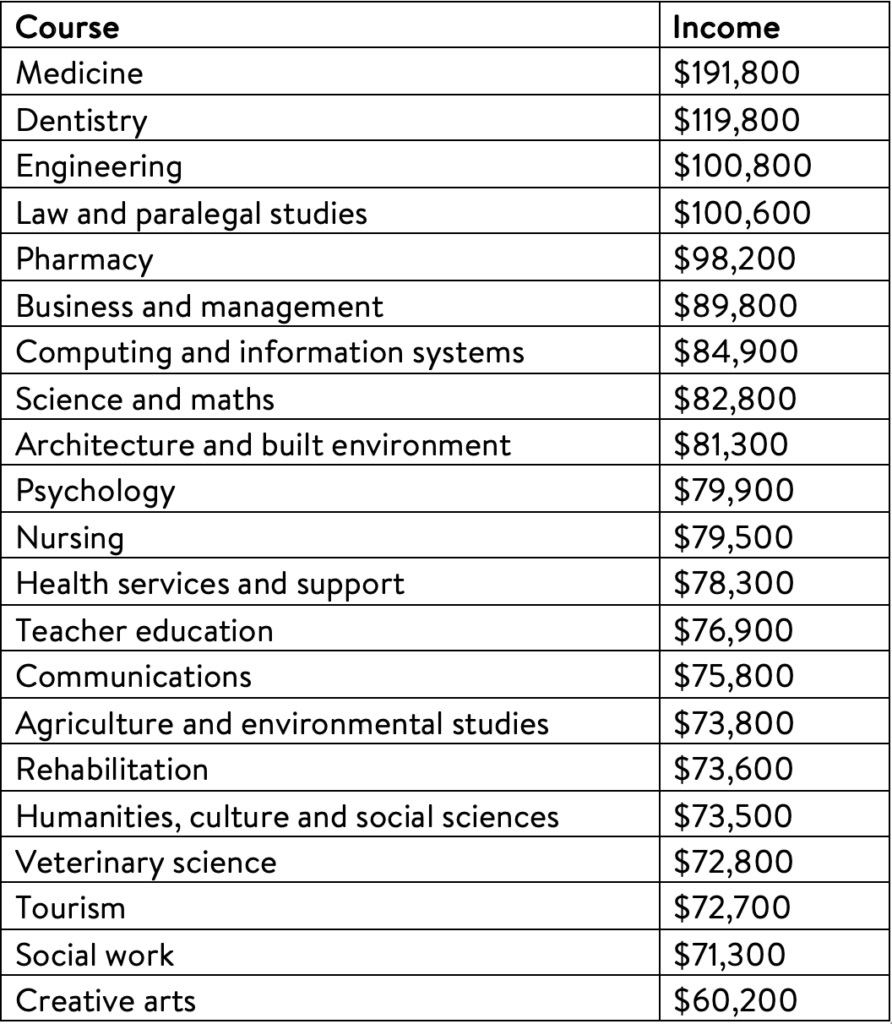As an international student, deciding where to study probably seems like one of the most important decisions you’ll have to make. In many ways, it is! Choosing the right education provider in Australia will have a major impact on your lifestyle, your cost of living and many other areas of your life.
But when it comes to your future income, it isn’t quite as significant as you might have thought. New research from the Department of Education, Skills and Employment (DESE), the Australian Taxation Office (ATO) and the Australian Government Actuary (AGA) has revealed that what you study has far more bearing on your earning potential than where you study.
Let’s take a closer look at the findings and what they mean for your academic and professional future.
Understanding the analysis
This analysis features the most detailed data on graduate studies in Australia’s history. It examines incomes across all industries for sub-bachelor, bachelor and postgraduate coursework graduates. The graduates in question were broken down into three categories: those who finished their course one, five and nine years before the study. While the analysis was published in November 2021, the study used taxation data from the 2017-2018 financial year.
The key finding? That the course a student studied has a much greater effect on their graduate salary than the university at which they studied.
In fact, a graduate’s course was the most influential factor, accounting for roughly 9.2 per cent of the variation in a 2007 graduate’s income in 2018. Courses in fields like dentistry, engineering, law and medicine provided consistently high incomes. However, courses in fields like creative arts, social work, tourism and veterinary science provided consistently low incomes. You can see the full list of median incomes by course below.
The median income in 2018 of 2007 graduates
Note: Incomes are adjusted to remove other possible influences such as a student’s age, gender, socio-economic status, language background, etc.
Source: Department of Education, Skills and Employment
The second most influential factor was gender, which accounts for 5.2 per cent of the income variations. Women who graduated in the 2007 cohort were earning $26,700 less per year than men.
In contrast, the university that a graduate attended had a very small impact, accounting for only 1.5 per cent of the earnings variation. The type of institution (for example, if the university is a part of the Group of Eight) also made up only 1.1 per cent.
It’s also worth noting that other elements – such as the graduate’s disability status, Indigenous status, linguistic background and socio-economic status – played a minor role. Each of these factors accounted for less than 1 per cent of the variation.
What does this mean for me?
These statistics are incredibly valuable in predicting your future income depending on the course you choose. However, it’s important to remember that these figures and the careers in Australia that are in demand are constantly changing, especially with the pandemic.
As you can see in the analysis, graduate salaries are shaped by many external factors. For example, it notes that the global financial crisis (GFC) led to a 10 per cent decline in real median incomes in 2015. These figures didn’t recover until 2018.
While the long-term financial effects of COVID-19 have yet to be seen, the analysis recognises that a similar downturn in incomes is possible.
What you need to consider when choosing a course
The study and its results serve as a helpful reminder to pick your course carefully. Not only should you consider your degree’s earning potential, but you should choose a field of study you’re passionate about.
That said, selecting the right institution is still vital. Although it doesn’t have as much of an effect on your earning potential, it’s still a very important consideration. As we mentioned, it will significantly shape your lifestyle, affordability and many other areas.
Plus, certain universities are ranked higher than others, giving them more international recognition and prestige. For example, you may have heard of the Group of Eight (Go8) Universities, which are Australia’s most renowned institutions according to global rankings. However, there are plenty of other university networks in addition to the Go8, and university rankings are based on many different factors, including teaching, research capacity and citations.
Of course, what really matters in a university extends far beyond these criteria. It’s also essential to think about location, diversity and campus culture.
For more guidance on how to choose the right course for you, click here.






